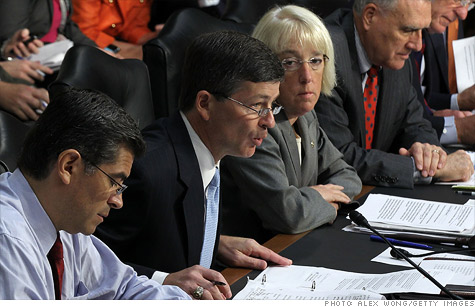Search News

The super committee at work.
NEW YORK (CNNMoney) -- Well, the experiment is over.
Stumbling over taxes and entitlements, the so-called super committee failed to agree on a debt reduction package of at least $1.2 trillion.
And so the committee will go down as one more ill-fated attempt by lawmakers to bridge the ideological divide between Democrats and Republicans on fiscal issues.
But other than that, not much is going to happen. At least not right away.
The "automatic" budget cuts that were supposed to deter super committee members from punting won't actually kick in until 2013. And that gives Congress more than 13 months to modify the law.
There will be tremendous pressure to do so.
The cuts would slash $1.2 trillion in defense and nondefense spending. Exempt from the cuts: Social Security and programs for low-income people, such as Medicaid. Medicare cuts, meanwhile, would be limited.
Top officials at the Pentagon have already laid out in explicit detail the ways in which military readiness and capabilities would be damaged if the $600 billion in defense cuts go through. And Democrats will be very reluctant to let cuts to Medicare and other nondefense program go into effect.
"The Congress is not bound by this," Sen. John McCain said last month. "It's something we passed. We can reverse it."
Even before the super committee failed, members were discussing how the automatic cuts will be modified.
"I can't imagine that, knowing of the importance of national defense, that both Democrats and Republicans wouldn't find a way to work through that process so we still get to $1.2 trillion in cuts, but it doesn't all fall on defense," Sen. Jon Kyl said Sunday on Meet the Press.
Now failure is a reality.
The 12-member panel's deadline for a final vote was Wednesday, and any blueprint had to be made available 48 hours in advance of a committee vote.
Lawmakers didn't meet the deadline, and the co-chairs admitted failure in a statement issued after the market close on Monday.
And really, the committee's troubled negotiations reflected the substantial systemic and ideological challenges faced by Congress at large.
Debt and budget experts agree that in order to get the country back on a sustainable fiscal track, Congress needed to "go big" on a deal that tackles the big drivers of future debt -- entitlements and health care.
That kind of grand bargain would require debt reduction of $3 trillion to $4 trillion over ten years -- far more that the super committee's low-end goal of $1.2 trillion.
Indeed, if the committee had agreed to cuts of only $1.2 trillion, U.S. debt would have continued to grow faster than the economy.
And fiscal hawks had worried that the committee, unable to agree on substantive issues, would instead populate the plan with small-fry spending cuts and a variety of "fake" savings. ![]()
| Overnight Avg Rate | Latest | Change | Last Week |
|---|---|---|---|
| 30 yr fixed | 3.80% | 3.88% | |
| 15 yr fixed | 3.20% | 3.23% | |
| 5/1 ARM | 3.84% | 3.88% | |
| 30 yr refi | 3.82% | 3.93% | |
| 15 yr refi | 3.20% | 3.23% |
Today's featured rates:
| Latest Report | Next Update |
|---|---|
| Home prices | Aug 28 |
| Consumer confidence | Aug 28 |
| GDP | Aug 29 |
| Manufacturing (ISM) | Sept 4 |
| Jobs | Sept 7 |
| Inflation (CPI) | Sept 14 |
| Retail sales | Sept 14 |